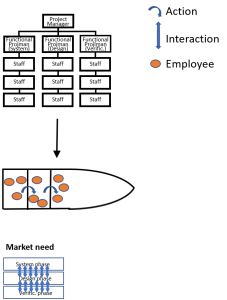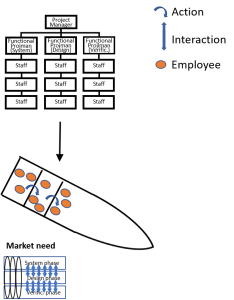We can look at the arisen problem with the needed speed, as it is no owner of the interactions needed between the silos. The managers are responsible for their respective group, and also support interactions within the silo and the projects are responsible for the actions between the phases. But, the interactions between the silos has never been anyone’s responsibility.
With another speed increase, the companies get into true pain, and the thinking at that time and still today is the opposite to the needed solution, which will be thoroughly examined in these blog posts about the oil in the organisation, “to solve” (but, instead of oil many organisations put in pre-glued sand, to put it crassly).

Now the interactions needed may not only be a problem between the silos, but also within the silos, with interactions never stated in the Product-oriented processes, and therefore not prepared for.
With a market that is uncertain and requiring products that we do not know if we can do, the direction of the business will be very unsure. If we cannot embrace complexity, when the situation is uncertain, we will not only be late to the market, we will definitely also go in the wrong direction and come to the market with the wrong product. Our boat is off course!

But, do not forget that we only embrace complexity when the situation is uncertain and we need to gain knowledge. When we know what to do, we are in the ordered domains of the Cynefin™ framework, and then, we just do it with or without the need of experts.
Next blog post will be the wrap-up and a presentation of our newly found principles. Can you already see them?

